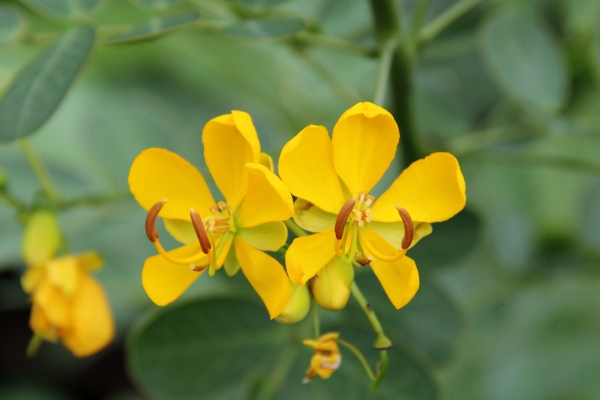Christmas Senna
(Senna bicapsularis)
Christmas Senna (Senna bicapsularis)
/
/

Fan Wen
CC BY-SA 4.0
Image By:
Fan Wen
Recorded By:
Copyright:
CC BY-SA 4.0
Copyright Notice:
Photo by: Fan Wen | License Type: CC BY-SA 4.0 | License URL: https://creativecommons.org/licenses/by-sa/4.0 | Uploader: Fanwen619 | Publisher: Wikimedia Commons | Title: Cassia_bicapsularis_(1).jpg | Notes: User created page with UploadWizard |
















Estimated Native Range
Summary
Senna bicapsularis, commonly known as Christmas Senna or Christmasbush, is an evergreen shrub native to tropical and subtropical regions, including the Caribbean, Central America, and Northern South America. It is typically found in disturbed areas, along roadsides, and in secondary forests. This species can vary greatly in size, ranging from 2 to 12 meters tall, and often branches from near the base, forming a low spreading crown. The leaves are pinnate with small, oval leaflets, and the bright yellow flowers are quite showy, blooming profusely in spring and winter. The flowers, 12–16 mm long, are grouped in short racemes and are known to attract pollinators such as bees and butterflies.
Christmas Senna is valued for its ornamental qualities, including its vibrant yellow flowers that can add a splash of color to gardens during the cooler months. It is used in landscaping as a specimen plant, for hedges, or in mixed borders. It adapts well to a range of conditions but prefers full sun to part shade and medium water, with well-draining soil. While it is drought-tolerant once established, regular watering will encourage more lush growth and flowering. Gardeners should be cautious, as Senna bicapsularis can become invasive outside its native range, spreading by seed and outcompeting native vegetation.CC BY-SA 4.0
Christmas Senna is valued for its ornamental qualities, including its vibrant yellow flowers that can add a splash of color to gardens during the cooler months. It is used in landscaping as a specimen plant, for hedges, or in mixed borders. It adapts well to a range of conditions but prefers full sun to part shade and medium water, with well-draining soil. While it is drought-tolerant once established, regular watering will encourage more lush growth and flowering. Gardeners should be cautious, as Senna bicapsularis can become invasive outside its native range, spreading by seed and outcompeting native vegetation.CC BY-SA 4.0
Plant Description
- Plant Type: Shrub, Vine, Tree
- Height: 6-12 feet
- Width: 8-10 feet
- Growth Rate: Moderate
- Flower Color: Yellow
- Flowering Season: Spring, Winter
- Leaf Retention: Evergreen
Growth Requirements
- Sun: Full Sun, Part Shade
- Water: Low, Medium
- Drainage: Medium
Common Uses
Bee Garden, Bird Garden, Butterfly Garden, Hedges, Low Maintenance, Showy Flowers, Street Planting
Natural Habitat
Native to disturbed areas, along roadsides, and in secondary forests
Other Names
Common Names: Rambling Cassia, Moneybush, Yellow Candlewood, Yellow Candle Wood
Scientific Names: , Senna bicapsularis, Cassia bicapsularis, Cassia berterii, Cassia alcaparillo, Adipera bicapsularis, Cassia laevigata, Cassia transversali-seminata, Cathartocarpus bicapsularis, Diallobus bicapsularis,
GBIF Accepted Name: Senna bicapsularis (L.) Roxb.